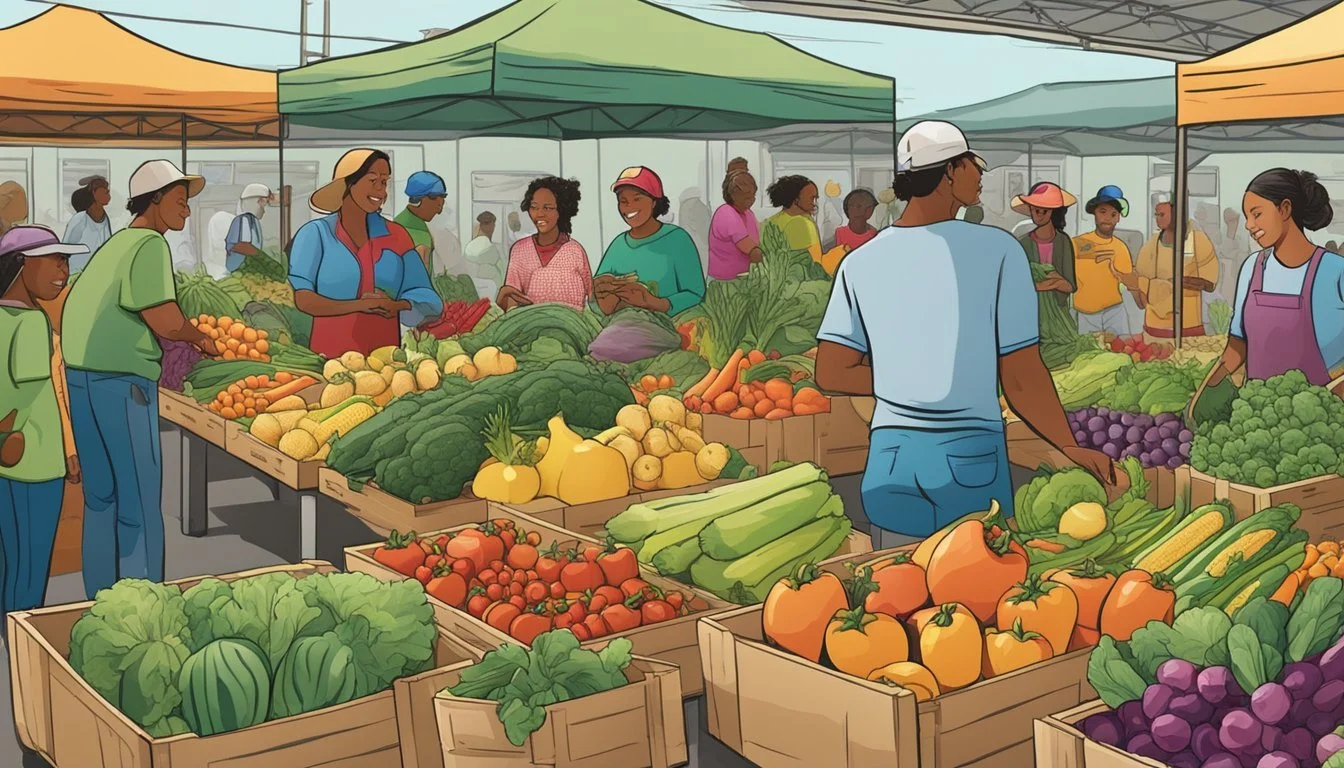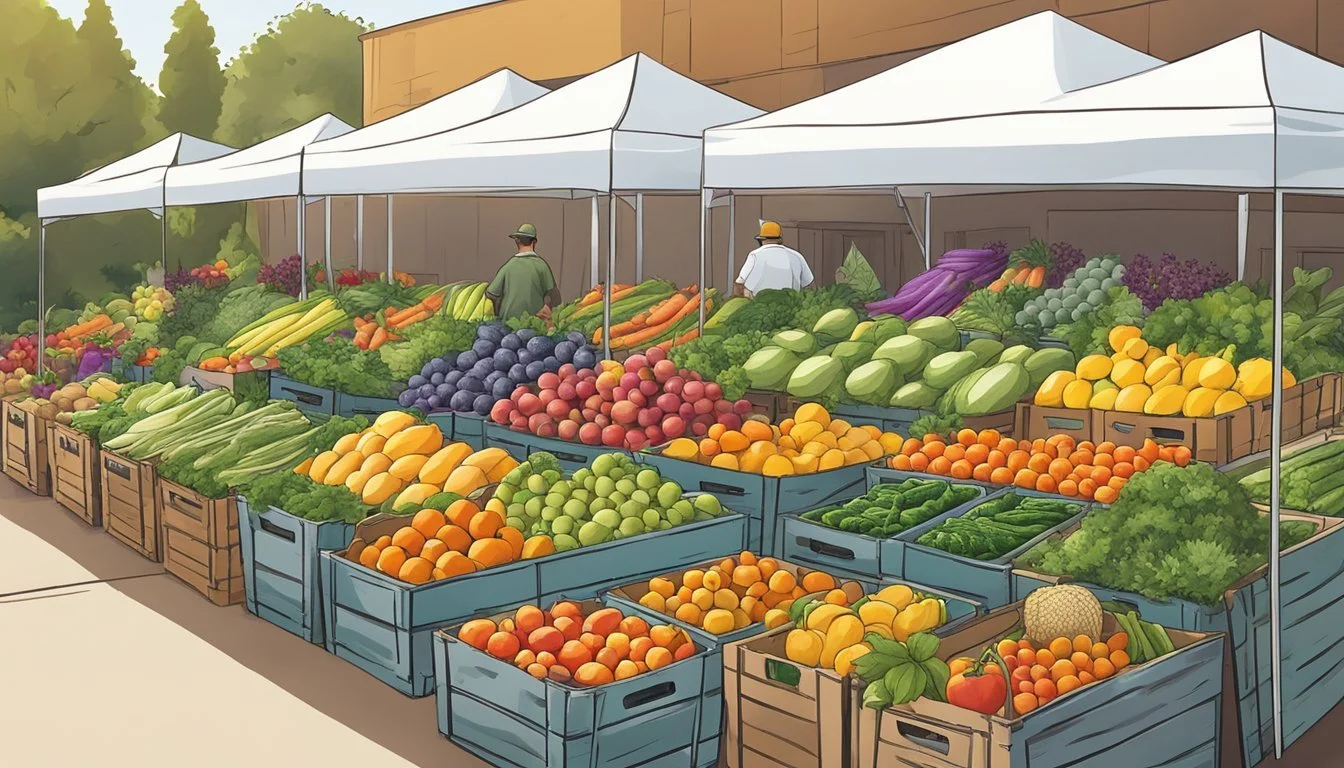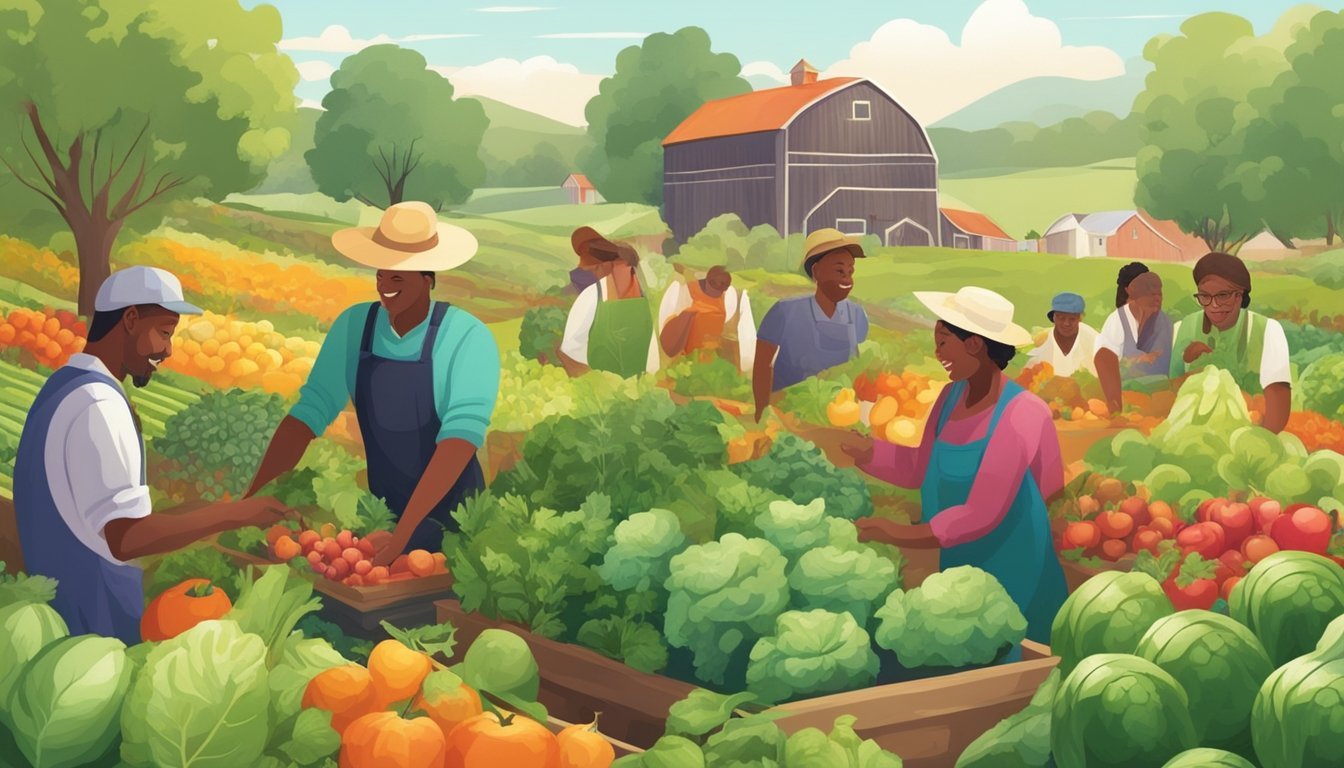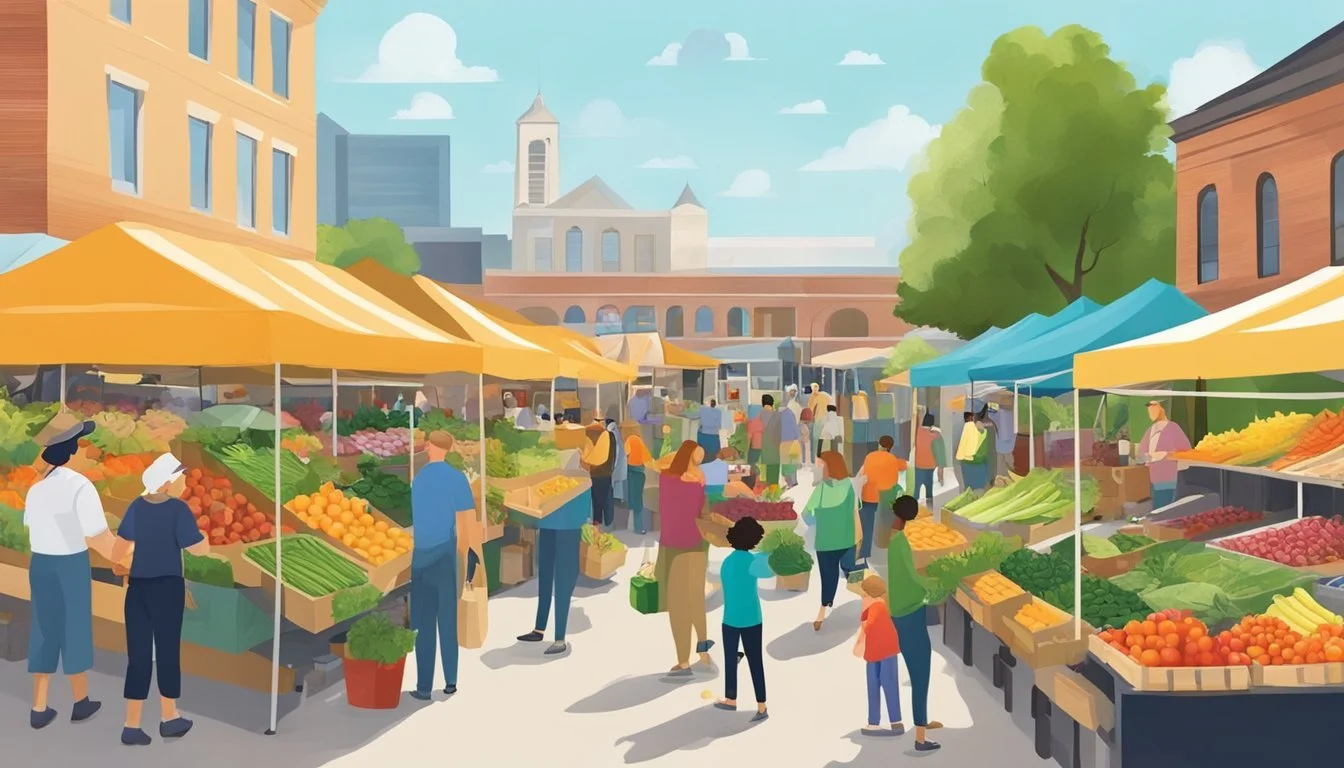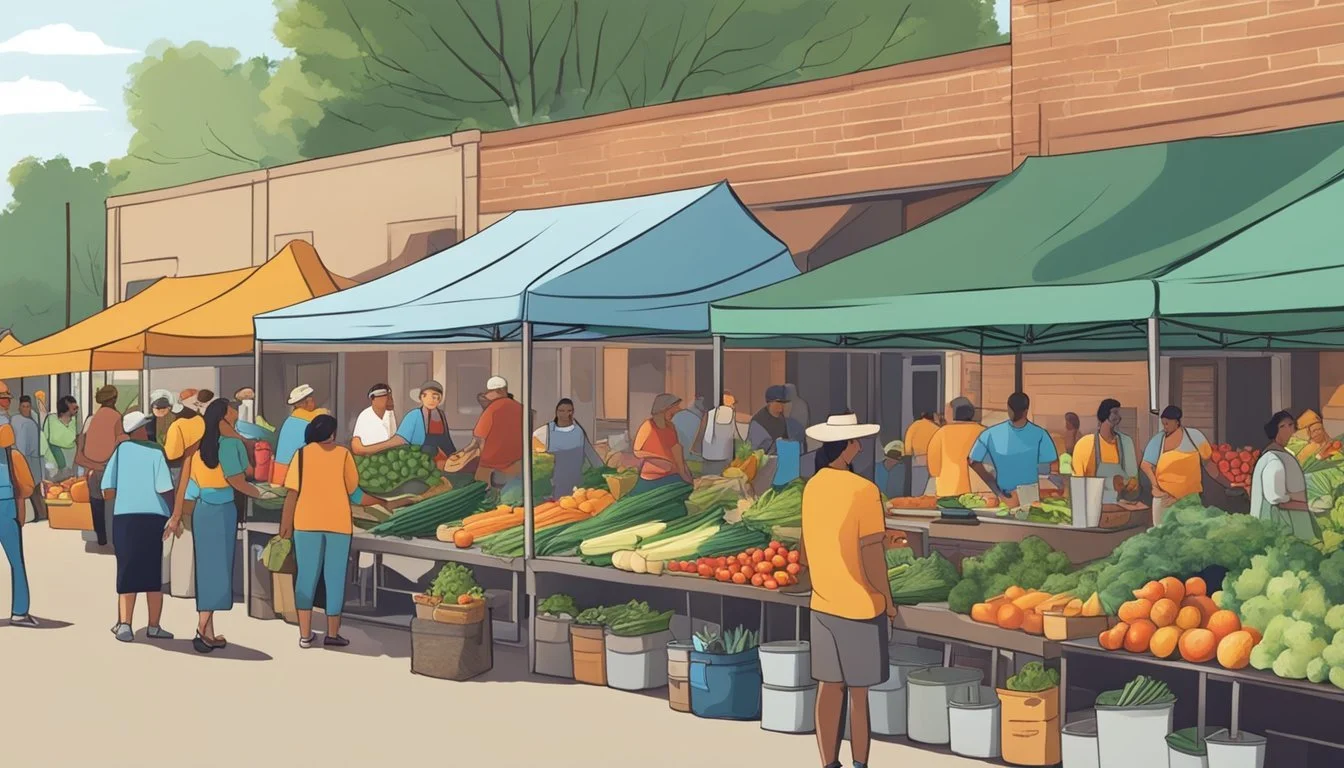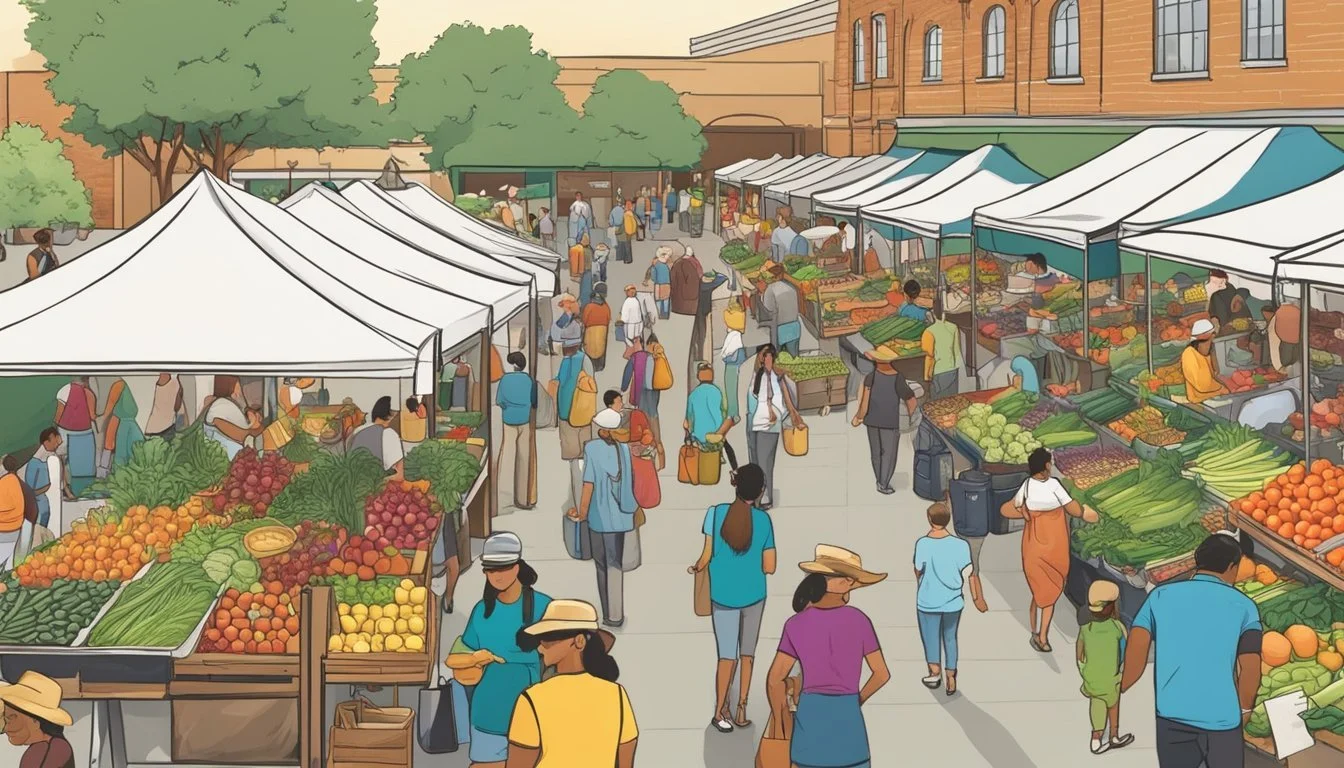Community Supported Agriculture (CSA) in Frisco, TX
A Guide to Local Farm Partnerships
Community Supported Agriculture, commonly referred to as CSA, provides a direct link between local consumers and nearby farmers. In Frisco, TX, the CSA model has gained traction as residents seek out fresh, organic produce and other farm products directly from the source. By committing to a share in a local farm's harvest, community members receive a regular delivery of seasonal goods, fostering a relationship with the farmers and a deeper understanding of where their food comes from.
Frisco's engagement with CSAs is part of a growing trend that prioritizes sustainability and supports the local economy. Members of CSAs in and around Frisco, such as those offered by reputed organic farms, have the privilege of enjoying a diverse array of products that go beyond just vegetables. Some include meats, eggs, and artisanal goods, broadening the scope of traditional CSA boxes and enriching the community’s culinary landscape.
Through the CSA programs, Frisco residents are not only assured of the food's freshness but also of the sustainable practices employed in its cultivation. This procurement method encourages organic farming and reduces the carbon footprint associated with long-distance food transportation. As a result, CSAs contribute to preserving the environment while promoting public health and providing an avenue for agriculture education.
Understanding CSA
Community Supported Agriculture (CSA) embodies a model of food production and distribution that connects local farmers directly with consumers. This system fosters a community-centric approach where benefits extend to both producers and members.
History and Concept of CSA
The CSA model traces its origins back to the 1960s in Europe and Japan, with significant influence attributed to Swiss farmer Jan Vander Tuin. He is credited with introducing this concept to the United States in the 1980s, with one of the first farms being Indian Line Farm in Massachusetts, along with New Hampshire's Temple-Wilton Farm. CSA functions on a basic yet transformational idea: community members pledge support to a farm operation, and the growers in return provide a share of the harvest.
Key Players in CSA Concept:
Jan Vander Tuin: Influential in the CSA movement's arrival in the U.S.
First U.S. CSA Farms: Indian Line Farm, Temple-Wilton Farm
Members typically purchase a subscription at the beginning of the growing season and receive regular distributions of fresh produce, representing their "share" of the farm's harvest. This economic relationship benefits the farm by providing upfront capital and assures members fresh, locally-produced food.
Benefits of Community Supported Agriculture
The benefits of engaging with Community Supported Agriculture are manifold. From an environmental perspective, CSAs support sustainable farming practices by reducing the need for long-distance transportation, which in turn minimizes the carbon footprint of food distribution. Additionally, CSA members tend to receive produce that is fresher, and organic options are often available, such as those provided by select farms near Frisco, TX.
Advantages for Community and Environment:
Local: Supports the local economy and farmers.
Sustainable: Encourages environmentally friendly practices.
Freshness: Offers fresher produce compared to traditional retail outlets.
Organic: Organic produce options are often available, beneficial to both health and the environment.
The direct-to-consumer model also fosters a stronger sense of community by connecting individuals with the source of their food, promoting food education, and encouraging a shared investment in the health and sustainability of local agriculture. CSA members often enjoy the experience of trying new vegetables and fruits that they might not have been exposed to otherwise, leading to a more diverse and nutritious diet.
Participating in CSA Programs
Participating in a Community Supported Agriculture (CSA) program in Frisco, TX, involves purchasing a membership from local farms, which provides residents with a regular supply of fresh, seasonal food. Members subscribe to shares that are typically delivered weekly.
How CSA Works
A CSA program functions on a subscription basis where members buy shares in a farm's upcoming harvest. This model establishes a unique partnership between local farmers and consumers, fostering community engagement and supporting sustainable agriculture. In return for their commitment, members receive a periodic assortment of farm-fresh produce, typically on a weekly basis. The contents of each share are dictated by seasonal availability and harvest yields.
Finding Local CSA Farms
To find local CSA farms in the Frisco, TX area, prospective members can utilize resources such as the LocalHarvest database. Farms like Good Earth Organic Farm are listed with their location, practices, and contact information. It is advisable to validate the currency of information directly with the farms as contact details and offerings may change.
Local CSA Farms Near Frisco, TX:
Good Earth Organic Farm: Organic practices, family-owned, located 70 miles northeast of Dallas.
Summit CSA - High Country Conservation Center: Offers CSA shares with local produce pickup.
TexasRealFood: Provides listings with contact information for various CSA farms; note that updates may be needed.
Types of CSA Shares
CSA shares can vary widely and are often customizable. Typical shares include a box of vegetables, but options may extend to include other farm products such as fruits, eggs, meats, and cheeses. The share type usually depends on what each specific farm offers and might also reflect the level of membership subscribed to by the consumer.
Sample CSA Share Types:
Vegetable Share: A variety of seasonal vegetables.
Full Farm Share: A mix of produce, eggs, meats, and cheeses.
Custom Share: Allows members to select preferences within the farm's seasonal offerings.
By understanding the workings of CSA programs, knowing how to locate local CSA farms, and being aware of the various types of shares, residents of Frisco, TX, can actively participate in their local food economy, supporting sustainable practices and enjoying fresh food directly from the source.
CSA Offerings in Frisco
In Frisco, TX, residents can access a variety of fresh, locally-grown products through community-supported agriculture (CSA) programs. These initiatives connect consumers with local farms offering seasonal produce, organic options, and sustainable farming practices.
Seasonal Products Available
Throughout the year, CSAs in Frisco offer a rotation of seasonal produce. Customers can expect a diverse selection of vegetables and fruits that change depending on the time of year. During the spring and summer months, one might find an abundance of leafy greens, tomatoes, berries, and stone fruits. In contrast, fall and winter shares often include root vegetables, winter squash, and apples.
Organic and Sustainable Options
Many farms near Frisco prioritize organic and sustainable practices. Good Earth Organic Farm, for instance, is one of the early adopters of certified organic farming in Texas. Such farms ensure consumers receive products free from synthetic pesticides and fertilizers. The focus on sustainability not only supports the health of the environment but also promises wholesome, nutrient-rich food for community members.
Local CSAs and Farms List
Residents interested in joining a CSA program can explore the following local operations:
Good Earth Organic Farm
Location: Celeste, TX
Offerings: Certified organic vegetables, fruits, and more.
Contact: Directly for the latest information and offerings.
LocalHarvest CSA Network
Find CSAs: Search for CSAs in and around Frisco using their platform.
Options: Multiple farms with a variety of products including vegetables, fruit, and meat.
TexasRealFood
Services: Connects consumers to local CSAs and farm box schemes.
Location: Listings near Frisco, TX 75035 and 75036.
By participating in CSA programs, residents in Frisco can enjoy fresh, local, and sustainable products throughout the year, while directly supporting their farming community.
Benefits of Joining a CSA
Joining a CSA provides residents in Frisco, TX with a wealth of advantages, from enhancing their diet with fresh, nutrient-rich produce to fostering a sustainable local food system. Here are some explicit benefits subdivided into key areas:
Supporting Local Agriculture
By becoming CSA members, individuals directly support local farmers in and around Frisco, maintaining a vital connection to the people who cultivate their food. This partnership helps to sustain local agriculture and preserves the agricultural heritage of the area.
Direct impact: When community members invest in a CSA share, they are directly contributing to the financial stability and success of local farms.
Local farm preservation: This economic support helps keep farmland in use and farmers on their land, combating the trend toward industrial-scale agriculture.
Nutritional Advantages
CSA subscribers gain access to a diverse array of fresh fruits and vegetables, often picked within hours of delivery. The nutrient content of freshly harvested produce is typically higher due to reduced time in transit and storage.
A variety of nutrients: A rotating selection of seasonal vegetables ensures a broad spectrum of vitamins and minerals in the diet.
Freshness: The produce available through CSAs is characteristically fresh, which can enhance both flavor and nutritional value.
Economic and Environmental Impact
CSAs can have a positive influence on both the economy and the environment. Members back small businesses and contribute to creating a more sustainable community food system.
Supporting the economy: Members' investments help keep money within the local area, bolstering the regional economy.
Lower environmental footprint: Reducing the distance food travels from farm to table decreases carbon emissions, and sustainable farming practices used by many CSA farms further minimize environmental impact.
Fresh, local, and sustainability are at the heart of the CSA model, delivering tangible benefits for individuals and the community at large.
Membership and Costs
Community Supported Agriculture (CSA) programs in Frisco, TX offer an engaging method for consumers to obtain fresh, locally-produced food while supporting regional agriculture. These programs typically involve upfront membership fees that provide members with a share of the season's harvest.
Understanding CSA Membership Fees
CSA membership fees can vary widely based on the farm’s offerings and the length of the subscription. In Frisco, TX, consumers may encounter a range of prices, reflecting factors like farm operational costs, the variety of produce offered, and the quantity of food provided per share. For instance, membership fees can range from $540.00 to $700.00 for a seasonal share, which may include a diverse assortment of vegetables and possibly other farm products. It is important for potential members to understand what is included in a share to gauge the actual value and savings they may achieve through membership.
Payment Plans and Budgeting
Farms may offer different payment plans to accommodate the financial needs of their members. Plans can include the full payment up front, or installment options that spread the cost over several months. This flexibility can assist members in budgeting for their CSA shares without facing the burden of a single, lump-sum payment. Interested consumers should reach out to the CSA provider directly to inquire about payment options and to ensure that the information is current. By utilizing payment plans, members not only support local producers but may also save money compared to purchasing equivalent organic produce at retail prices.
Consumer Insights
Community Supported Agriculture (CSA) groups in Frisco, TX have cultivated a customer base that values high-quality, nutritious food sourced directly from local farms. These consumers' satisfaction often stems from the freshness of produce and the palpable impact of supporting their local community.
Customers' Experiences and Reviews
Customers of CSAs in Frisco often praise the fresh, seasonal vegetables they receive, noting how this direct farm-to-table approach enhances the quality of their meals. Reviews indicate a clear appreciation for the nutritious content of the food provided. Community engagement is frequently mentioned, with members feeling a sense of connection to the food they consume and to the local food movement. Consumers often highlight the transparent and educational aspects of their CSA, appreciating the chance to learn more about the source of their food and the farmers’ practices.
Transparency: Customers appreciate understanding where their food comes from.
Education: Members value learning about sustainable farming practices.
Quality: Reviews regularly mention the exceptional taste and freshness of produce.
Handling and Preparation of Produce
The handling and preparation of CSA produce is a crucial element of consumer satisfaction. CSA groups in Frisco ensure their produce is carefully harvested and handled with minimal processing, maintaining its nutritional integrity. Consumers receive instructions on how to best store and prepare their fresh produce to maximize both taste and nutrients. This educative approach is appreciated, as it empowers customers to handle their produce properly, ensuring they get the most out of their investment in the local agricultural community.
Storage Guidelines: Clear instructions on how to store items to prolong freshness.
Preparation Tips: Advice on preparing ingredients to retain nutritional value and flavor.
Frequently Asked Questions
This section answers commonly asked questions regarding the differences between Community Supported Agriculture (CSA) and farmers' markets, and the impact a CSA can have on grocery shopping habits in Frisco, TX.
CSA vs. Farmers Market
Community Supported Agriculture (CSA) and farmers' markets both serve as platforms to obtain fresh, local produce. However, they have distinct characteristics. CSAs often require a subscription, where members receive a regular, usually weekly or biweekly, supply of produce in the form of a CSA box. This supports farmers directly by providing a stable income and reduces marketing costs. In contrast, farmers' markets operate on a weekly basis where consumers can purchase produce from various vendors. While both support local farmers, a CSA represents a commitment to one particular farm or cooperative.
CSA: Subscription model, pre-packed boxes, direct support to one farm.
Farmers Market: Weekly markets, purchase from multiple vendors, variety at each visit.
Impact on Grocery Shopping Habits
Participating in a CSA can significantly alter one's grocery shopping habits. When individuals subscribe to a CSA, they often find the need to visit the grocery store less frequently due to the regular provision of fresh produce in their CSA boxes. This can encourage healthier eating patterns by increasing the consumption of fresh, in-season vegetables and fruits. It may also inspire subscribers to plan meals around the CSA contents, which can introduce variety and novelty into their diets compared to the consistent selection of a typical grocery store.
Less frequent grocery store trips: Due to regular CSA box deliveries.
Meal planning changes: Built around the contents of the CSA box.
End-of-Season Considerations
As the growing season concludes in Frisco, TX, CSA members and farmers turn their attention to harvesting the final yields and preparing for the next season. These efforts ensure a seamless transition and maintain CSA's role in providing fresh, organic produce to the community.
Harvesting and Collection
The end of the season is a critical period for CSA farmers as they gather the last of the seasonal crops. They prioritize organic harvesting techniques to ensure the produce maintains its high-quality standards. Members are typically notified of the final collection dates and can often participate in the harvesting process. This hands-on approach fosters a deeper connection with the food they consume and educates them on sustainable farming practices.
Key Harvest Activities:
Final yield assessments
Clearing fields for next season's seeds
Organizing member pick-up schedules
Renewing CSA Subscriptions
Once the final crops have been collected, attention shifts to subscription renewal. CSA operators in Frisco reach out to current members with details on renewing their share for the upcoming season. They provide specific information on the available crop variety for the next year, including new organic seed offerings.
Renewal Process Includes:
Member notifications
Early subscription incentives
Outline of the crop plan for the next season
Community and Communication
Community engagement and clear communication are essential pillars of Community Supported Agriculture (CSA) programs in Frisco, TX. These programs rely on robust connections within the community and efficient communication channels to enlighten members and foster involvement.
Events and Gatherings
CSA programs in Frisco, TX often host events and gatherings to connect consumers and farmers. These events serve as platforms for members to meet the producers, understand farming practices, and learn about the sources of their food. Local farms might organize seasonal harvest festivals, cooking demonstrations, or farm tours. This face-to-face interaction strengthens the bond between community members and local farmers.
Seasonal Festivals: Celebrate the community’s harvest and seasonal produce.
Cooking Demonstrations: Educate members about preparing seasonal produce.
Farm Tours: Offer insights into sustainable farming practices and foster transparency.
CSA Communication Channels
Effective communication channels are vital for the success of CSAs. They ensure members are up-to-date with the latest news, delivery schedules, and available produce. Frisco's CSAs leverage multiple channels to maintain open and consistent dialogue with their community.
Email newsletters: Provide members with weekly updates, recipes, and news.
Social Media Pages: Engage with the community through daily posts and direct messaging.
Dedicated Websites: Centralize information about share availability, event schedules, and sign-up procedures.
By utilizing these communication strategies, CSAs in Frisco maintain a connected and informed community, essential for the sustainability and growth of local agriculture.
Additional Resources
For those interested in Community Supported Agriculture (CSA) within Frisco, TX, a wealth of resources is available to deepen their understanding and facilitate their participation in the local food movement. Two important avenues for information and connection are local directories and educational materials, which can provide comprehensive data and learning opportunities for consumers and producers alike.
LocalHarvest and Other Directories
LocalHarvest remains a pivotal resource in locating CSAs near Frisco, TX. Their platform offers extensive listings and a user-friendly interface. Interested individuals can access data on different farms, including their marketing practices and the variety of products they offer, which can range from organic vegetables to grass-fed beef.
LocalHarvest Directory:
Search Feature: Easy to navigate with filters for specific CSA preferences.
Listings: Provides comprehensive information on regional farms along with contact details.
Additional directories and APIs also exist that facilitate connections between consumers and local food producers, allowing for an updated view of the available CSAs and their offerings.
Educational Materials and Seminars
Consumers and farmers alike can expand their knowledge through a variety of educational materials and seminars. These resources typically cover sustainable farming practices, organic certification processes, and strategies for successful CSA marketing and management.
Educational Resources:
Online Materials: Articles, blogs, and guides related to CSA models and benefits.
Seminars: Workshops and webinars hosted by agricultural experts and local farmer associations.
Staying informed through these educational avenues ensures that participants are well-equipped to support and sustain the CSA model, which is integral to fostering a robust local food economy in Frisco and beyond.

